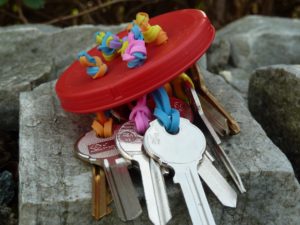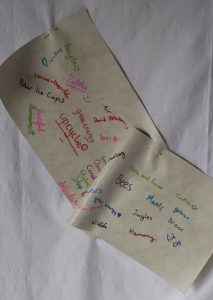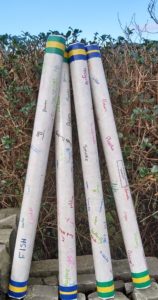A golden opportunity to regain focus
 One of the topics I like to cover in my environmentally-themed music workshops is up-cycling. I talk about the merits of reusing and up-cycling over recycling, then I introduce participants to a range of ‘trash’ musical instruments. In my workshops I usually demonstrate a cuica (Brazilian/Monkey drums), shakers, an ocean box, key jingles and a rainmaker. When they hear the sounds that can be created using up-cycled materials, everyone is usually amazed.
One of the topics I like to cover in my environmentally-themed music workshops is up-cycling. I talk about the merits of reusing and up-cycling over recycling, then I introduce participants to a range of ‘trash’ musical instruments. In my workshops I usually demonstrate a cuica (Brazilian/Monkey drums), shakers, an ocean box, key jingles and a rainmaker. When they hear the sounds that can be created using up-cycled materials, everyone is usually amazed.
The Rainmakers
Recently, while preparing for an upcoming project in Scoil Íosagáin, a local primary school, I set about gathering the materials to make 4 rainmakers. The most important item on the list was used cardboard tubes. The pupils would decorate a large sheet of paper using an environmental theme. This would then cover the tube. I wanted to ensure that each finished rainmaker could be wiped clean so I resigned myself to having to resort to using sticky-backed plastic as a protective covering. I knew this wasn’t an ideal solution but I wanted to ensure that the new instruments would withstand life in a busy classroom and be around for a long time.
Waste materials
 Armed with my 15 year old up-cycled rainmaker to help me compare tube sizes, I called to Inishowen Blinds in Buncrana. Loretta and Christina sorted me with the perfect cardboard tubes and, on observing that my old rainmaker was decorated with scraps of fabric, Loretta informed me that they could also supply me with scraps of waste fabric and vinyl. I had been so concerned with ensuring that my finished musical instruments would be durable and easy to clean that I didn’t give any further consideration to trying to use other waste materials.
Armed with my 15 year old up-cycled rainmaker to help me compare tube sizes, I called to Inishowen Blinds in Buncrana. Loretta and Christina sorted me with the perfect cardboard tubes and, on observing that my old rainmaker was decorated with scraps of fabric, Loretta informed me that they could also supply me with scraps of waste fabric and vinyl. I had been so concerned with ensuring that my finished musical instruments would be durable and easy to clean that I didn’t give any further consideration to trying to use other waste materials.
Losing focus
As the main purpose of the rainmaker exercise was to demonstrate how to up-cycle and make use of waste materials, I had truly lost my focus. I left Inishowen Blinds with enough large pieces of vinyl to fully cover each tube. This made my task much easier, saved paper, made my rainmakers stronger and reduced the need to buy a large quantity of sticky-backed plastic.
Taking a step back
 My experience with the rainmakers made me realise just how easily we can lose sight of the bigger picture. The Coronavirus (COVID-19) has brought the world to its knees and much has been written about the social and economic impact of the unfolding crisis. We are confined to our homes and for many, daily life is unlike anything experienced before. If you were to take a step back, could you identify old habits that might not be serving you or the planet well anymore?
My experience with the rainmakers made me realise just how easily we can lose sight of the bigger picture. The Coronavirus (COVID-19) has brought the world to its knees and much has been written about the social and economic impact of the unfolding crisis. We are confined to our homes and for many, daily life is unlike anything experienced before. If you were to take a step back, could you identify old habits that might not be serving you or the planet well anymore?
Golden opportunity
Might this break from our usual reality be a golden opportunity? What about trying to create new rituals and make little changes to help the environment? It’s worth remembering that helping the environment helps you too and can also save you money.
Here are some ideas to help you see things with new eyes- we’d love to hear your ideas in the comments below.
1. Figure out if there are items in your home that could be recycled that are currently being missed. Do you have a recycling bin in your bathroom? Do used toilet roll holders end up in the wrong bin because no one thinks to recycle them?
2. Check your daily recycling and see if there are containers you could re-use. Takeaway containers are great for storing leftovers but so are ice-cream tubs and soup tubs. You probably won’t need to buy plastic lunchboxes for a long time! They’re also handy for storing things like tiny toys, jigsaws that lost their boxes, paperclips, spare keys or screws. Not every storage situation requires a trip to IKEA. Check here to learn how to make basic percussive instruments and make some music- https://youtu.be/3KOQu9vzNAk
3. Life in lockdown has meant a drastic reduction in car journeys. This is a good time to evaluate whether all those car journeys were really necessary. It can be easy to hop in the car to run an errand or get some groceries you forgot to get in the weekly shop. But what if you consciously reduced your journeys by planning errands more efficiently? Are you finding you can manage with one weekly shop?
4. Go through your wardrobe and check if you have old clothes that could do with a bit of a lift. It can be very satisfying wearing something you transformed by your own efforts. Check here for a few ideas, or better still use your imagination and get creative- https://thesewingloftblog.com/100-ways-to-upcycle-your-clothing/
5. The closure of restaurants and cafés has meant most of us are eating almost all our meals at home now. Unfortunately, this can also mean an increase in food waste. Think about the food you often throw out. Do you buy fruit because you intend to eat it but never do? Do you find yourself dumping most of the bags of salad you buy? Being more realistic about what you will use will save money and reduce waste.
